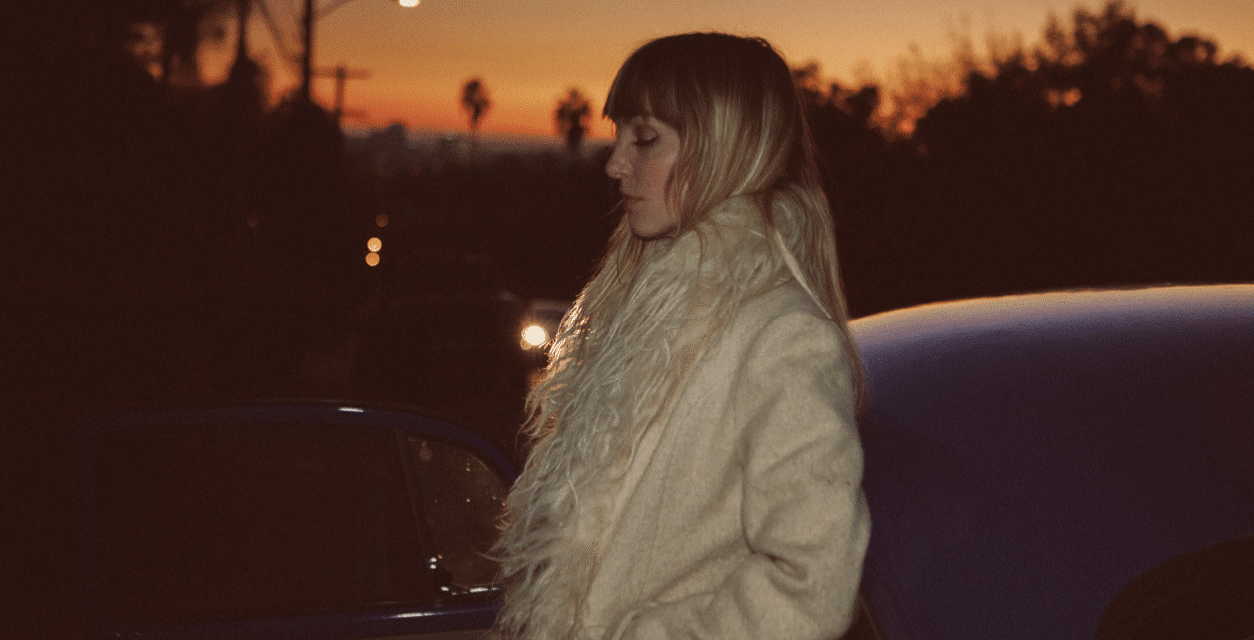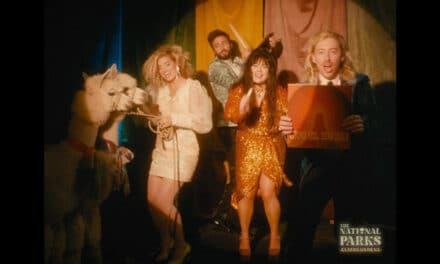Photo credit: Jess Ewald
After years spent amplifying the voices of others, Laura Burhenn has returned to her own. On November 7, The Mynabirds will release their long-awaited album It’s Okay To Go Back If You Keep Moving Forward on Burhenn’s own Our Secret Handshake imprint — a stripped-down, visceral meditation on grief, silence, and the radical power of song.
The album’s lead single, “Ramona, Patron Saint Of Silence,” is out today, streaming on Apple Music, Bandcamp, and YouTube. More than a song, it’s a hymn to the fragile yet ferocious act of reclaiming one’s voice. “After losing my best friend, my dog, and my grandmother in quick succession in the middle of the pandemic, something cracked open,” Burhenn says. “In that stillness, I saw how much pain I’d been avoiding — and heard the faintest whisper of my own voice calling me back.”
“‘Ramona’ was born from that moment — a song to a fictional Patron Saint of Silence, thanking her for keeping me and my voice alive. Silence can comfort you, protect you, but ultimately it teaches you that your voice is your greatest strength. Music isn’t something I make to sell — it’s medicine. And I still need it to survive.”
That sense of rawness defines the new record. Produced by Pierre de Reeder (Rilo Kiley) and recorded at 64 Sound, the collection features three new songs alongside stripped-back versions of seven Mynabirds favorites. No overdubs. No autotune. Just grand piano, live vocals, and a band playing together in real time. The result is imperfect, intimate, and deeply human. “I joked about calling it AI Could Never,” Burhenn laughs.
For Burhenn, It’s Okay To Go Back If You Keep Moving Forward is also a political act. Known for merging feminist, openhearted pop with activist urgency, she continues her advocacy with the “Disarm Spotify” campaign, removing all of her music from the platform in protest of Daniel Ek’s investments in the defense sector. Joining artists like Deerhoof, Xiu Xiu, and Kadhja Bonet, she’s urging the industry to divest from destruction and reinvest in creativity, survival, and solidarity.
It’s a fitting continuation for a career built at the intersection of art and activism. Since her 2010 debut on Saddle Creek, Burhenn has shapeshifted across genres — from the soul-soaked Americana of What We Lose in the Fire We Gain in the Flood, to the incendiary folk-pop of Generals, the synth intimacy of Lovers Know, and the bombastic urgency of Be Here Now. She’s toured the world, performed with The Postal Service and Foster the People, and used her voice at rallies alongside Bernie Sanders, always tethering her music to movements larger than herself.
With It’s Okay To Go Back If You Keep Moving Forward, Burhenn strips it all down to the barest elements: piano, voice, silence, and courage. It’s a reminder that sometimes moving forward means returning to where it all began — and that in the quiet, we can still find strength enough to burn down broken systems and sing louder together.
👉 It’s Okay To Go Back If You Keep Moving Forward is out November 7 on Our Secret Handshake. Stream the new single Ramona, Patron Saint Of Silence now on Bandcamp, Apple Music, and YouTube.
“Ramona, Patron Saint of Silence” is rooted in your own period of stillness and grief. How did silence become both a wound and a teacher for you?
This is such a beautifully complex question to unpack; I’ll do my best. In moments of trauma, our survival instinct can lead us straight into the arms of one of the 4 F’s: Fight, Flight, Fawn or Freeze. And sometimes a trauma is something you don’t realize has happened until years after it’s occurred. For me, I had a delayed reaction to a particular trauma where I suddenly saw that I’d been trying to fawn, fight and fly my way out of it, denying it had even happened for over a decade by continuing to sing, shout, put out records — in a way, faking that I was fine. But when I finally saw the truth of what I was doing (big D Denial), I had to sit in my silence — for what turned out to be about 8 years — and figure out how to speak my truth again. People talk about writer’s block; but that’s not what this period of silence was. It was learning to hear my true voice again. It was remembering why I ever started singing in the first place as a child: as life-saving music therapy. So the 8 years of silence was tough because I needed music and singing to heal the wound; but I also needed to remember how to sing the truth to really heal it. It was as if my Voice wouldn’t let me sing again until I relearned how to sing from my heart.
You’ve said this song is a thank-you to silence for keeping your voice alive. What does it feel like now to reclaim that voice after years of not wanting to touch the piano?
I always worried how I would feel about my voice as I get older, but it’s funny how a period of silence can literally help you hear yourself better. It’s like leaning in close to listen when someone speaks softly. I feel like I’ve reached a deeper connection with my voice now, a truer knowing, a more guttural YES to the fullness of being a wholly imperfect and yet fully divine human being. The fresh sound of self-acceptance.
The new album, It’s Okay To Go Back If You Keep Moving Forward, strips everything down to piano and voice, almost an ego death, as you’ve described it. Why was returning to that raw core necessary at this point in your career?
I started playing piano when I was 5 and writing songs around 14. Those were long nights, just me and the piano, pressing my big feelings into every key. The piano was my confidante. My truest friend I didn’t have to impress, and certainly couldn’t hide from. That’s the place where every song I’ve ever written has come from. And it felt important to strip back whatever personas I’d played around with on each previous Mynabirds record — each one I’m so incredibly proud of, but each one fighting for attention in such a loud, chaotic world — to let the songs stand on their own, unadorned. Any musician knows the fresh hell being asked of us to create content, make it all iconic, burn brighter than everyone else’s to be seen. These songs didn’t want that. They wanted to be fully themselves, and more than enough by simply showing up. No sequins. No leather. And certainly no stilettos.
You joked about calling the record AI Could Never. In a fast-paced, tech-driven industry, why was it important for you to make something “imperfect, raw, and deeply human”?
Oh God, I’m so sick of autotuned everything — it’s the photoshop/facetune we don’t talk about in the music industry. But we all know it’s everywhere. It’s become so EASY for things to be perfect. And it’s so inhuman, and so boring! AI is now capable of spitting out a billion new songs that are based on autotuned, metronomic, highly robotic schtick. But songs shouldn’t be cars churned out on a factory line, sleek and impenetrable. There’s nothing sticky to get into our souls.
I insisted that we record every song live in the room with no click tracks, tempos fluctuating like a heartbeat does when something revs you up or lets you down. I left all the lilts and little imperfect notes in there, and the little clicks of the mallet sticks against the vibraphone or drum heads, and the air in the room. Because AI can’t replicate what it feels like to really be in a room with real people. And I wouldn’t want it to.
Your past albums have shapeshifted from soul to folk-pop to synth intimacy to bombastic pop-rock. How do you see this new stripped-back chapter fitting into The Mynabirds’ evolution?
When I’ve played stripped down solo shows in the past, it’s been lovely when people say they love those arrangements, maybe even more than the studio versions. So this record is close to that. And I hope it feels like sitting in your living room one-on-one with a close friend every time you put the record on.
You’ve used your music and platform to amplify activism, from immigrant rights to environmental justice. How does leading the “Disarm Spotify” campaign intersect with your work as an artist?
That Daniel Ek is presiding over a company that’s been underpaying (or not paying) artists fairly since its inception and is now platforming and promoting fully AI-generated bands — it’s all so disgusting. But when I heard he’d taken the billions he profited on the backs of unpaid/underpaid labor and invested nearly $700 million into an AI military start-up, of which he is now chairman? As a pacifist who’s been protesting war since shortly after 9-11, the idea that a billionaire tech CEO would take my songs — or anyone else’s beloved creations that saved them from the pit of despair — and turn them into bombs is anathema, pure and simple. Music is medicine. It should be the salve bringing us together across political and cultural divides, across borders and barriers. I’m here for the healing. Not the rise of the oligarchs selling us endless wars that only fatten their bank accounts. No thanks.
You’ve toured the world, played Tiny Desk twice, and even sung alongside Bernie Sanders at rallies. When you look back at those moments, how do they inform the quieter, more vulnerable record you’re making now?
I am so incredibly grateful for and proud of those moments. But honestly my favorite part about the two you’ve highlighted is that I have a longtime friendship with Bob Boilen from Tiny Desk — begun nearly 2 decades ago when he asked my first band, Georgie James, to play a video series he had on NPR called “Project Song.” We have years of dinner meet-ups in DC, NYC and Austin, and text messages about so many curiosities like birding and Brian Eno. And I remember the second time I sang with Bernie, he shook my hand and said, “Hey — I remember you!” It’s like being at a party and sitting in the corner quietly talking with one person. I’m so grateful when I get those intimate, real moments in big public spaces. Making this record is kind of like that.
Working with Pierre de Reeder of Rilo Kiley on this album, how did his production shape the live-in-the-room feel you were aiming for?
Pierre has such a gentle egoless way about him. He really held space for my vision. He’d let me play through a song 8 times until we got the perfect take — even if that “perfect” take had a very human note or piano part in it. He really just sat back and let the songs shine. It takes an incredible musician to show his skills by making listening the focus of his work. One of my favorite touches he added was the vintage analogue drum machine to “Disarm,” adding this kind of heartbeat to the bed of the song. And when we finished the take, he quietly walked over and turned it off, so you can hear this sputtering out, softening, dying of the machine as it comes to rest. It feels like the human desire to fight literally disarming in a deep karmic way.
“Ramona” imagines voices rising together in a collective choir, burning down broken systems. How do you reconcile the personal medicine of music with its power as a political tool?
That a voice can vibrate at the right frequency to shatter glass is the right poetry for this time. Living in California, I think a lot about fire. Sequoia pine cones literally need fire to open up, drop their seeds and regenerate. Prescriptive fire is often needed to clear undergrowth, and clearing the undergrowth — the small, eventually strangling stuff — can save the whole forest. The music of medicine warms us up and reminds us of our power to shatter what’s keeping us small, and to burn away what’s threatening our very existence. In this time, there are powers and political leaders working to silence the voices of trans and queer, indigenous folks, people of color, immigrants, women, animals and whole ecosystems, the entire Palestinian people as they push on old racist, antisemitic, and islamophobic tropes to instill fear and create division between us. It’s the fascist, white supremacist, capitalist playbook hard at work. Remembering and using our voices in this time, and amplifying the voices of others before they are silenced forever — that is our most important work.
After everything, the silence, the grief, the reinvention, what do you hope listeners carry with them when they step into It’s Okay To Go Back If You Keep Moving Forward?
The world is so loud right now. I hope this record gives listeners space to stop and sit with their own griefs, angers, joys — and remember the power of their own true voice. I hope it offers a moment of reflection to go as far back as you need, to breathe and dig deep. And to keep going.





